Frequently Asked Questions
1) In what countries does MI Americas operate and how are they chosen?
MI Americas focuses on 5 core countries of strategic importance: Haiti, Mexico, Colombia, Peru and the USA. These core countries were identified by —
- Social disparities between and among the countries and lack of access to basic social services for those living in poverty and;
- Their vulnerability to the regular recurrence of natural disasters especially earthquakes, hurricanes and flooding.
Malteser International annual report download.
2) How does MI Americas engage with Order of Malta associations?
MI Americas programs are highly partner-oriented. We work through the network of the Order of Malta and its Association in Central and South America. For many years, we have been supporting the Associations in disaster response and preparedness. We support immediate disaster-response in life saving measures including distribution of food, medicine, shelter material and alike. We can rely on a strong network that is on the ground in the countries where we have our own infrastructure like Colombia and Haiti, or utilize the network of the Order of Malta Associations like in Guatemala, responding to Hurricane Iota.
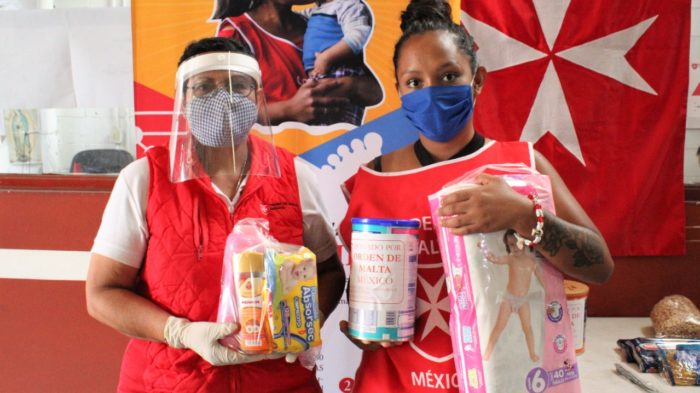
We always work through the Catholic Church network ‐ the most trusted partner in the communities we serve. But all emergency support can only be released when funding is available. Our goal is to have an emergency response fund that we can rely on so that we can respond to disasters immediately, however, at this time we do not yet have one and we must fundraise for every emergency, so all support is critical and urgent.
3) Does MI Americas intend on increasing support for refugees in the United States over the next five years?
Our programs are identified based on needs, existing gaps, giving special attention to remote, and forgotten communities rather than the achievement of growth objectives in specific countries. We target the most vulnerable in society in all our projects no matter if it is emergency or development oriented. Refugees and internally displaced people are always among the most vulnerable. Depending on available funding, we will support as many as possible, as evidenced by our humanitarian relief to Venezuelan refugees.
4) How many employees does Malteser International have?
As of 2019, Malteser International employs 886 people in 31 countries. The majority are in Asia (483) and Africa (247), and 92 % of our project staff are from the countries we serve. Malteser International Americas has six employees in the US, four based in Cologne, and 147 in our program countries in the Americas.
5) Is Malteser International considered a “Work of the Order”?
Malteser International is the flagship of the Order of Malta s international Hospitaller work. Malteser International is truly a primary work of the Order. It is the worldwide relief agency of the Order of Malta for humanitarian aid.
6) In addition to serving those in need, does Malteser International evangelize?
Malteser International is guided by Christian values and based on the humanitarian principles of impartiality, independence, and neutrality. We evangelize through the results of our work but do not proselytize. We serve the sick and the poor regardless of race, color, ethnicity, or religion.
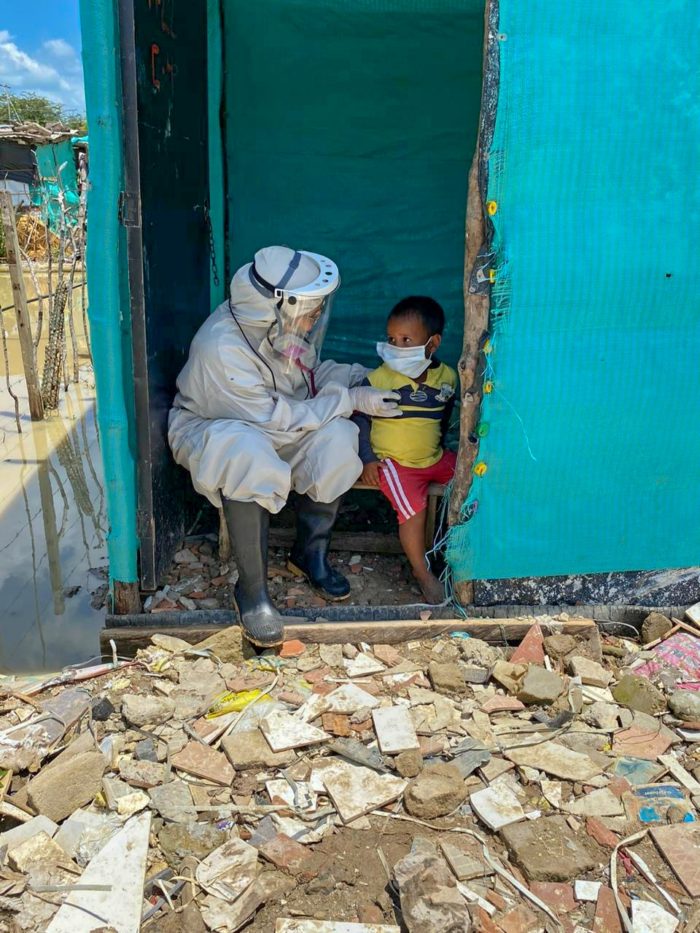
7) How are the MI Americas’ humanitarian opportunities publicized and staffed/supplied in times of crisis?
Depending on the size of the operation and volume of relief goods to be procured we always implement donor rules and regulations through public announcements of staff we are hiring and goods to be procured. Tender committees will analyze applications and bids that have been received and recommend candidates and goods to finally be purchased. Strict internal control systems are in place plus additional monitoring procedures. Additionally, we follow procedures required by our grantors such as the USAID and the State Department’s Bureau of Population, Refugees and Migration.
8) What are the most important challenges facing our organization today?
The COVID‐19 pandemic is obviously the greatest challenge we faced in 2020. Humanitarian actors must consider the wider implications of the pandemic at the same time as they respond to the urgent needs of affected populations, particularly the poorest and most vulnerable. The economic costs of containing Covid‐19 are severe. And the number of people going hungry has doubled to above 270 million people from the already high level of 135 million people reported in 2019.
Disruptions to agriculture, supply chains and international trade exacerbate global food insecurity. The humanitarian needs associated with the pandemic and the policy responses to it are mounting and funding for the response remains woefully inadequate. MI Americas has doubled its project volume to respond to the health challenges caused by the pandemic. In the long-term, we must ensure that we integrate COVID-19 measures into our regular planned programs. But we can only succeed if funding is available.
9) What gives you hope within the UN framework going forward?
Throughout our work, we have been committed to several cross‐cutting goals, many of which are mirrored in the United Nations Sustainable Development Goals (SDGs). Also known as the Global Goals, the SDGs have provided the world with a common framework to tackle our greatest challenges. Part of the larger 2030 Agenda, the SDGs aim to eradicate poverty and hunger, address climate change, and close the gender inequality gap once and for all. They have also provided useful targets to facilitate the implementation and monitoring of each goal.
Our more than 60 years of experience in the humanitarian field has taught us that designing and implementing projects in partnership with the beneficiaries and local organizations strengthen the sustainability and impact of our activities. We strive to build the capacities and resiliency of communities. Whether it’s working with indigenous Wayuu leaders in rural Colombia or young community stewards in the violent neighborhoods of Port‐au‐Prince, our trusted relationships within the communities have proved to be the most effective means of furthering our goals and SDGs.
10) In what capacity does Malteser International work with the UN system?
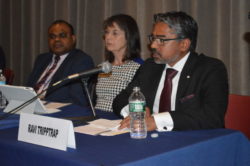
Malteser International has ECOSOC consultative status with the United Nations. This is the only forum where civil society organizations can advocate with the UN especially discussing policy issues and address the topics mentioned above.
Through our diplomatic representation at the UN, particularly at the General Assembly, we have a voice and can contribute to discussions, but do not participate in the preparation of documents and do not vote on any resolutions. This is because we are not considered an Observer State in that we do not have the trappings and status of a country or nation. We are an Observer Entity. We do, however, work closely with the Holy See, which has Observer State status, ensuring that any issues being presented to the UN which, we feel, are inconsistent with our view of humanitarian care and guidance, are adequately explored and discussed.
Additionally, we play an active role in participating in various committees and sub committees in New York and Geneva, to ensure that our voice is heard. There is no doubt, however, that the voices of faith based organizations and entities are louder and clearer now than they have been in decades and that the role of religions worldwide, and Christianity in particular, are being heard in the halls and meetings at the United Nations.
Malteser International partners and implements projects funded by UN agencies. None of these projects are related to reproductive health. Our values are based in the Catholic Church, and we act accordingly in all aspects of our work.
11) What are MI Americas’ 5-year and long-term goals?
Our overarching goal is to ensure that people live a healthy life with dignity. Service to people in need is at the heart of our work. As a Catholic organization inspired by both Christian values and humanitarian principles, our goal is to improve health, to strengthen resilience and to provide rapid response to emergencies.
Although relief and recovery are our core mandates, resilience is important to us; we aim to improve the capacity of communities to resist shocks. Whenever possible and whenever needed, we commit long term.
In the years to come, we will continue to scale-up our efforts to assist those in need — in 2020, we more than doubled the volume of our 2019 projects in the Western Hemisphere to $7.5 million. With capacity building of Associations of the Order of Malta in the Western Hemisphere, and other partners, MI Americas strives to increase the quality and impact of their programs. The overall objective is to reduce vulnerability and to help the sick and the poor to lead a healthy life, in dignity.
Specific short‐term goals include:
- Developing identity and brand recognition
- Strengthening our communications via different platforms
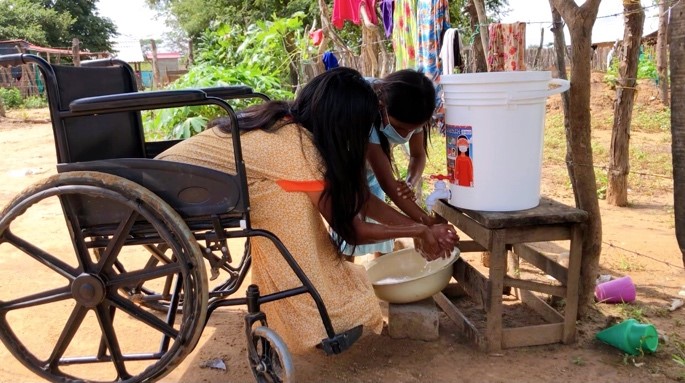
Keila and her eight-year-old daughter, in a rural indigenous village in Colombia, using a handwashing station gifted by MI Americas with the support of USAID. - Building an Emergency Fund so that we can respond to immediate and pressing needs with more agility.
- Meeting our fundraising goal of being self‐sustainable and increasing our program funding sources
12) What will your priority be for 2021?
The COVID‐19 pandemic will certainly occupy our attention in 2021, we will continue responding accordingly in our ongoing projects. At the same time, we cannot leave anyone behind. We still need to respond to the biggest humanitarian crisis in the Western Hemisphere – the Venezuelan Refugee crisis – and must continue our life-saving efforts.
13) How can we help?
- Spread the word of the valuable work of the Order of Malta and its entities so we get more people know us, get engaged, and support our efforts.
- Join us on social media (Facebook, Twitter, Linkedin) subscribe to our newsletter, and organize an event.
- Volunteer with us when opportunities are announced.
- Find out if your employer has a gift-matching program.
- Open doors for us at foundations you are familiar with and advocate for us.
- Pick Malteser International Americas as your charitable organization to support on Amazon Smile.
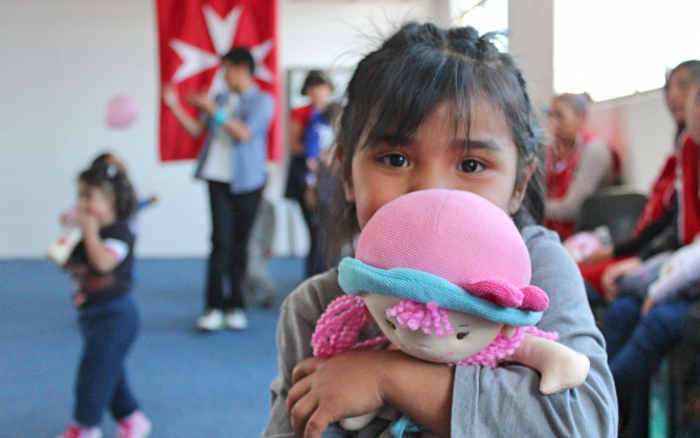
14) What are MI Americas’ top 3 achievements?
- Impacting the lives of more than 250,000 people in the Western Hemisphere through an operation overhead cost of less than 10%.
- Implementing lifesaving projects and responding to the biggest humanitarian crisis in the Western Hemisphere.
- Combatting the spread of the Coronavirus abroad and in the US.